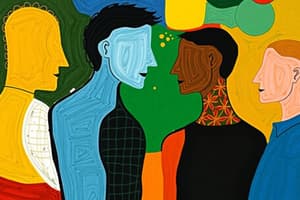Podcast
Questions and Answers
What does sociology primarily study?
What does sociology primarily study?
- The human body
- Natural sciences
- Mathematical models
- Society and human behavior (correct)
Sociology only focuses on macro-level social phenomena.
Sociology only focuses on macro-level social phenomena.
False (B)
What are the two components of the sociological perspective mentioned?
What are the two components of the sociological perspective mentioned?
Seeing the general in the particular and seeing the strange in the familiar.
Social ________ refers to an individual’s position in society based on factors like race and gender.
Social ________ refers to an individual’s position in society based on factors like race and gender.
Match the following terms with their descriptions:
Match the following terms with their descriptions:
Which is an example of a macro-level phenomenon studied in sociology?
Which is an example of a macro-level phenomenon studied in sociology?
Social biases against certain accents can be considered a less visible form of inequality.
Social biases against certain accents can be considered a less visible form of inequality.
During which century did sociology emerge as a discipline?
During which century did sociology emerge as a discipline?
Sociologists study the impact of ________ change driven by industrialization, urbanization, and political revolutions.
Sociologists study the impact of ________ change driven by industrialization, urbanization, and political revolutions.
Which of these is NOT a topic that sociology encompasses?
Which of these is NOT a topic that sociology encompasses?
Flashcards are hidden until you start studying
Study Notes
What is Sociology?
- Sociology is the scientific study of society and human behavior.
- It explores how individuals interact within social groups, and how these interactions shape societal structures, institutions, and processes.
The Scope of Sociology
- Sociology encompasses a wide range of topics, including economics, politics, culture, religion, family, education, and more.
- It examines both macro-level phenomena, such as social movements and global inequalities, and micro-level interactions between individuals.
The Sociological Perspective
- The sociological perspective encourages us to see the general patterns in specific behaviors and recognize the unfamiliar within the everyday.
- This involves:
- Seeing the general in the particular: Identifying how individual choices and experiences are shaped by broader social forces.
- Seeing the strange in familiar: Challenging assumptions and common sense understandings of the social world by looking at them through a critical lens.
Social Location and Marginalization
- Social location refers to an individual’s position in society based on factors such as race, class, gender, sexual orientation, religion, and age.
- It influences opportunities, experiences, and perspectives.
- Marginalization occurs when a social group is excluded from power and resources, often due to their social location.
Power and Inequality
- Societies are characterized by different forms of power, including economic, political, social, and cultural.
- These forms of power often lead to inequalities, both obvious (like income disparity) and less visible (like social biases against certain accents or dialects).
The Origins of Sociology
- Sociology emerged in the 19th century during a period of rapid social and economic change, driven by industrialization, urbanization, and political revolutions.
- Early sociologists sought to understand the dynamics of these changes and their impact on individuals and societies.
Sociology: The Study of Society and Human Behavior
- Sociology is the scientific study of society and how people interact within it.
- It examines both large-scale social structures like globalization and smaller-scale interactions between individuals.
The Scope of Sociology
- It covers a wide range of topics, including economy, politics, culture, religion, family, and education.
- Sociologists study both macro-level phenomena (e.g., social movements, global inequalities) and micro-level interactions (e.g., conversations, relationships).
The Sociological Perspective
- It encourages us to see patterns in behaviors and question assumptions about the social world.
- Seeing the general in the particular: Recognizing how broader social forces impact individual choices and experiences.
- Seeing the strange in familiar: Challenging conventional understandings of the social world by analyzing them critically.
Social Location and Marginalization
- Social location refers to an individual's position within society based on factors such as race, class, gender, and sexual orientation.
- Social location influences a person's opportunities, experiences, and perspective.
- Marginalization occurs when a social group is excluded from power and resources, often due to their social location.
Power and Inequality
- Societies involve various forms of power, including economic, political, social, and cultural.
- These power dynamics often create inequalities, both visible (e.g., income disparity) and less obvious (e.g., social biases).
The Origins of Sociology
- Sociology emerged in the 19th century during a period of rapid change caused by industrialization, urbanization, and political revolutions.
- Early sociologists aimed to understand the dynamics of these changes and their impact on individuals and societies.
Studying That Suits You
Use AI to generate personalized quizzes and flashcards to suit your learning preferences.




